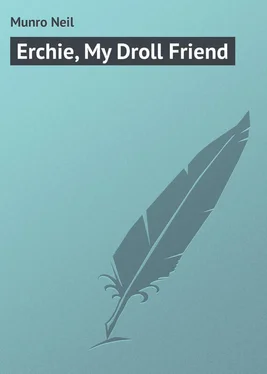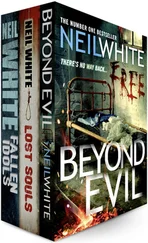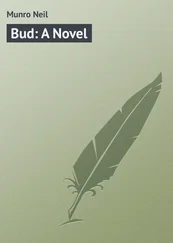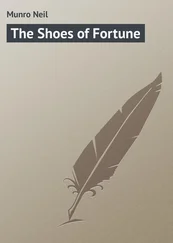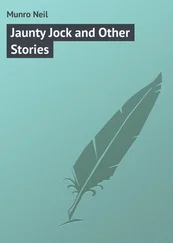Neil Munro - Erchie, My Droll Friend
Здесь есть возможность читать онлайн «Neil Munro - Erchie, My Droll Friend» — ознакомительный отрывок электронной книги совершенно бесплатно, а после прочтения отрывка купить полную версию. В некоторых случаях можно слушать аудио, скачать через торрент в формате fb2 и присутствует краткое содержание. ISBN: , Жанр: foreign_prose, на английском языке. Описание произведения, (предисловие) а так же отзывы посетителей доступны на портале библиотеки ЛибКат.
- Название:Erchie, My Droll Friend
- Автор:
- Жанр:
- Год:неизвестен
- ISBN:http://www.gutenberg.org/ebooks/47991
- Рейтинг книги:3 / 5. Голосов: 1
-
Избранное:Добавить в избранное
- Отзывы:
-
Ваша оценка:
- 60
- 1
- 2
- 3
- 4
- 5
Erchie, My Droll Friend: краткое содержание, описание и аннотация
Предлагаем к чтению аннотацию, описание, краткое содержание или предисловие (зависит от того, что написал сам автор книги «Erchie, My Droll Friend»). Если вы не нашли необходимую информацию о книге — напишите в комментариях, мы постараемся отыскать её.
Erchie, My Droll Friend — читать онлайн ознакомительный отрывок
Ниже представлен текст книги, разбитый по страницам. Система сохранения места последней прочитанной страницы, позволяет с удобством читать онлайн бесплатно книгу «Erchie, My Droll Friend», без необходимости каждый раз заново искать на чём Вы остановились. Поставьте закладку, и сможете в любой момент перейти на страницу, на которой закончили чтение.
Интервал:
Закладка:
“For wan thing,” said the cousin’s wife, “it’s aye a rale hearse we hae at Fintry and no’ a box under a machine, like thon. It was jist a disgrace. Little did his mither think it wad come to thon. Ye wad think it was coals.”
“And whit’s the maitter wi’ coals?” cried Duffy, his professional pride aroused. “Coals was his tred. Ye’re shairly awfu’ toffs in Fintry aboot yer funerals.”
The cousin’s wife stabbed her head all over again with her hair-pins, and paid no heed to him. Her husband evaded her eyes with great determination. “No’ that great toffs either,” she retorted, “but we can aye afford a bit crape. There wasna a sowl that left this close behind the corp the day had crape in his hat except my ain man.”
Then the man to whom Big Macphee owed money laughed.
“Crape’s oot o’ date, mistress,” Erchie assured her. “It’s no’ the go noo at a’ in Gleska; ye micht as weel expect to see the auld saulies.”
“Weel, it’s the go enough in Fintry,” said the cousin’s wife. “And there was anither thing; I didna expect to see onybody else but my man in weepers, him bein’ the only freen’ puir Macphee had but – ”
“I havena seen weepers worn since the year o’ the Tay Bridge,” said Erchie, “and that was oot at the Mearns.”
“Weel, we aye hae them at Fintry,” insisted the cousin’s wife.
“A cheery chap,” said Jinnet again, at her wits’-end to put an end to this restrained wrangling, and the man Big Macphee owed money to laughed again.
“Whit’s mair,” went on the cousin’s wife, “my man was the only wan there wi’ a dacent shirt wi’ Erchie tucks on the breist o’t; the rest o’ ye had that sma’ respect for the deid ye went wi’ shirt-breists as flet as a sheet o’ paper. It was showin’ awfu’ sma’ respect for puir Macphee,” and she broke down with her handkerchief at her eyes.
“Och! ta bleezes! Jessie, ye’re spilin’ a’ the fun,” her husband remonstrated.
Erchie pushed back his chair and made an explanation. “Tucks is no’ the go naither, mistress,” said he, “and if ye kent whit the laundries were in Gleska ye wadna wonder at it. A laundry’s a place whaur they’ll no’ stand ony o’ yer tucks, or ony nonsense o’ that kind. Tucks wad spoil the teeth o’ the curry-combs they use in the laundry for scoorin’ the cuffs and collars; they’re no’ gaun awa’ to waste the vitriol they use for bleachin’ on a wheen tucks. They couldna dae’t at the money; it’s only threepence ha’penny a shirt, ye ken, and oot o’ that they hae to pay for the machines that tak’s the buttons aff, and the button-hole bursters – that’s a tred by itsel’. No, mem, tucked breists are oot o’ date; ye’ll no’ see such a thing in Gleska; I’m shair puir Macphee himsel’ hadna ane. The man’s as weel buried as if we had a’ put on the kilts, and had a piper in front playin’ ‘Lochaber no More.’ If ye’ll no believe us, Duffy can show ye the receipted accoonts for the undertaker and the lair; can ye no’, Duffy?”
“Smert!” said Duffy,
But the cousin’s wife was not at all anxious to see accounts of any kind, so she became more prostrate with annoyance and grief than ever.
“Oot Fintry way,” said Erchie, exasperated, “it’s a’ richt to keep up tucked shirt-breists, and crape, and weepers, and mort-cloths, and the like, for there canna be an awfu’ lot o’ gaiety in the place, but we have aye plenty o’ ither things to amuse us in Gleska. There’s the Kelvingrove Museum, and the Wax-works. If ye’re no’ pleased wi’ the wye Macphee was buried, ye needna gie us the chance again wi’ ony o’ yer freen’s.”
The cousin’s wife addressed herself to her husband. “Whit was yon ye were gaun to ask?” she said to him.
He got very red, and shifted uneasily in his chair. “Me!” said he, “I forget.”
“No ye dinna; ye mind fine.”
“Och, it’s a’ richt. Are we no’ haein’ a fine time,” protested the husband.
“No, nor a’ richt, Rubbert Grant.” She turned to the others, “Whit my man was gaun to ask, if he wasna such a sumph, was whether oor kizzen hadna ony money put by him.”
“If ye kent him better, ye wadna need to ask,” said Duffy.
“He was a cheery chap,” said Jinnet.
“But was he no’ in the Shepherds, or the Oddfellows, or the Masons, or onything that wye?”
“No, nor in the Good Templars nor the Rechabites,” said Erchie. “The only thing the puir sowl was ever in was the Mull o’ Kintyre Vaults.”
“Did I no’ tell ye?” said her husband.
“Good-bye and thenky the noo,” said the cousin’s wife, as she went down the stair. “I’ve spent a rale nice day.”
“It’s the only thing ye did spend,” said Erchie when she was out of hearing. “Funerals are managed gey chape in Fintry.”
“Oh ye rascal, ye’ve the sherp tongue!” said Jinnet.
“Ay, and there’s some needs it! A flet fit, too, but a warm hert,” said Erchie.
V THE PRODIGAL SON
Jinnet, like a wise housewife, aye, shops early on Saturday, but she always “leaves some errand – some trifle overlooked, as it were – till the evening, for, true daughter of the-city, she loves at times the evening throng of the streets. That of itself, perhaps, would not send her out with her door-key in her hand and a peering, eager look like that of one expecting something long of coming: the truth is she cherishes a hope that some Saturday to Erchie and her will come what comes often to her in her dreams, sometimes with terror and tears, sometimes with delight.
“I declare, Erchie, if I havena forgotten some sweeties for the kirk the morn,” she says; “put on yer kep and come awa’ oot wi’ me; ye’ll be nane the waur o’ a breath o’ fresh air.”
Erchie-puts down his ‘Weekly Mail,’ stifling a sigh and pocketing his spectacles. The night may be raw and wet, the streets full of mire, the kitchen more snug and clean and warm than any palace, but he never on such occasion says her nay. “You and your sweeties!” he exclaims, lacing his boots; “I’m shair ye never eat ony, in the kirk or onywhere else.”
“And whit dae ye th’ink I wad be buyin’ them for if it wasna to keep me frae gantin’ in the kirk when the sermon’s dreich?”
“Maybe for pappin’ at the cats in the back coort,” he retorts. “There’s ae thing certain shair, I never see ye eatin’ them.”
“Indeed, and ye’re richt,” she confesses. “I havena the teeth for them nooadays.”
“There’s naething wrang wi’ yer teeth, nor ony-thing else aboot ye that I can see,” her husband replies.
“Ye auld haver!” Jinnet will then cry, smiling. “It’s you that’s lost yer sicht, I’m thinkin’. I’m a done auld buddy, that’s whit I am, and that’s tellin’ ye. But haste ye and come awa’ for the sweeties wi’ me: whit’ll thae wee Wilson weans in the close say the morn if Mrs MacPherson hasna ony sweeties for them?”
They went along New City Road together, Erchie tall, lean, and a little round at the shoulders; his wife a little wee body, not reaching his shoulder, dressed, by-ordinar for her station and “ower young for her years,” as a few jealous neighbours say.
An unceasing drizzle blurred the street-lamps, the pavement was slippery with mud; a night for the hearth-side and slippered feet on the fender, yet the shops were thronged, and men and women crowded the thoroughfare or stood entranced before the windows.
“It’s a wonnerfu’ place, Gleska,” said Erchie. “There’s such diversion in’t if ye’re in the key for’t. If ye hae yer health and yer wark, and the weans is weel, ye can be as happy as a lord, and far happier. It’s the folk that live in the terraces where the nae stairs is, and sittin’ in their paurlours readin’ as hard’s onything to keep up wi’ the times, and naething to see oot the window but a plot o’ grass that’s no’ richt green, that gets tired o’ everything. The like o’ us, that stay up closes and hae nae servants, and can come oot for a daunder efter turnin’ the key in the door, hae the best o’t. Lord! there’s sae muckle to see – the cheeny-shops and the drapers, and the neighbours gaun for paraffin oil wi’ a bottle, and Duffy wi’ a new shepherd-tartan grauvit, and Lord Macdonald singin’ awa’ like a’ that at the Normal School, and – ”
Читать дальшеИнтервал:
Закладка:
Похожие книги на «Erchie, My Droll Friend»
Представляем Вашему вниманию похожие книги на «Erchie, My Droll Friend» списком для выбора. Мы отобрали схожую по названию и смыслу литературу в надежде предоставить читателям больше вариантов отыскать новые, интересные, ещё непрочитанные произведения.
Обсуждение, отзывы о книге «Erchie, My Droll Friend» и просто собственные мнения читателей. Оставьте ваши комментарии, напишите, что Вы думаете о произведении, его смысле или главных героях. Укажите что конкретно понравилось, а что нет, и почему Вы так считаете.
